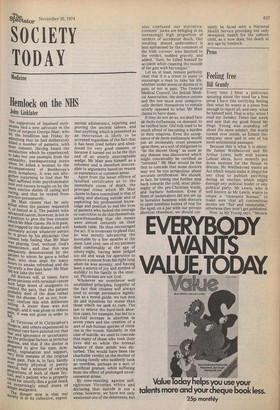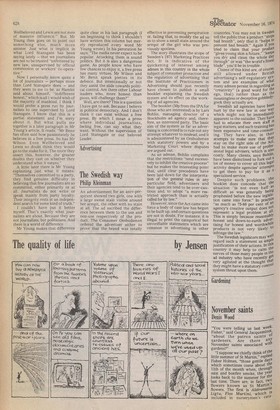Press
Feeling free
Bill Grundy
Every time I hear a politician spouting about the need for a free press I have this terrifying feeling that what he wants is a press free enough to report all, and only, what he himself said. That is why, when I read my Sunday Times last week and saw that my good friend Mr Hugo Young was sounding off about the same subject, the world turned over inside, as Ernest Hemingway once said in one of his more sentimental passages.
Because this is what it is about. Mr James Wellbeloved and Mr Arthur Lewis, both well known Labour idiots, have recently put down motions for the House to discuss. Mr Wellbeloved wants an Act which would make it illegal for any chap to publish anything during an election which might damage any _political leader or any political party. Mr Lewis, who is well known as Mr Lewis, wants to create a "clearance bureau" to make sure that all contentious stories are "fair and reasonable," otherwise they won't get published. Now, as Mr Young says, "Messra Wellbeloved and Lewis are not men of massive influence." But Mr Young then goes on to point out something else, much more sinister. Just what is implicit in what Lord Stansgate has been saying lately — that we journalists are not to be trusted "unfettered by new law, unsupervised by official commission or workers' co-operative."
Now I personally know quite a lot of journalists — perhaps more than Lord Stansgate does — and they seem to me to be, as Hamlet said about himself, "indifferent honest," which is all I would wish of the majority of mankind. I think I would prefer a press run by journalists to one supervised by Lord Stansgate. I know that this is a partial statement and I'm sorry about it. But what pulls me together is a later paragraph in Mr Young's article. It reads: "Mr Benn has often said how passionately he believes in a free press. So has Mr Wilson. Even Wellbeloved and Lewis no doubt think they would go to the stake for it. The more they assert this, however, the greater doubts they cast on whether they understand what it means." A little later there is Mr Young explaining just what it means: "Themselves committed to a party, they find genuine difficulty in believing that few journalists are so committed, either primarily or at all. Journalists do not write or speak mainly from party loyalty. Their integrity rests in an independent search for some kind of truth."
I couldn't have put it better myself. That's exactly what journalists are about. Because they are not journalists, but politicians. And there is a world of difference. Mr Young makes that difference quite clear in his last paragraph (I am beginning to think I shouldn't have written this column but merely reproduced every word Mr Young wrote). In his peroration he says: "The media never expect to be popular. Attacking them is sound politics. But it is also a dangerous game. As people know who have few chances to enjoy it, a free press has many virtues. Mr Wilson and Mr Benn speak pieties in its defence. But intentionally or not they assist the slide towards political control. Are there other Labour leaders who, more honest than pious, will challenge them?" Well, are there? This is a question I have got to ask. Because I believe in political democracy. And I don't think it can exist without a free press. By which I mean a press where individual journalists, feeling free, can say what they want. Without the supervision of Lord Stansgate or our beloved Leader.



































 Previous page
Previous page